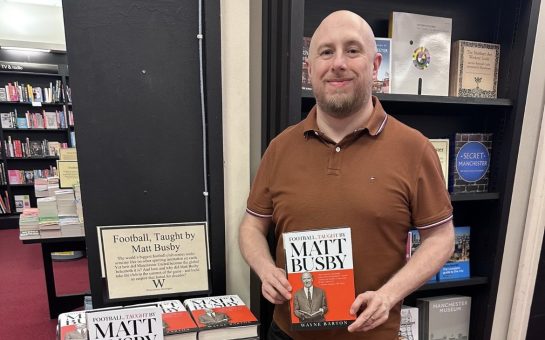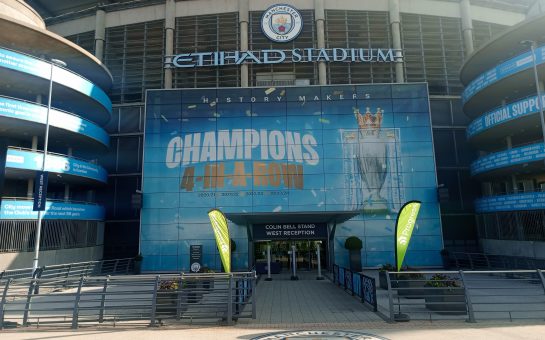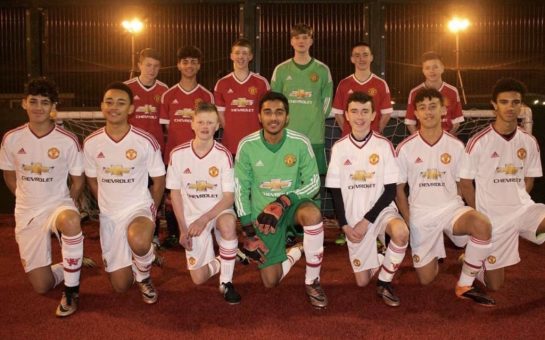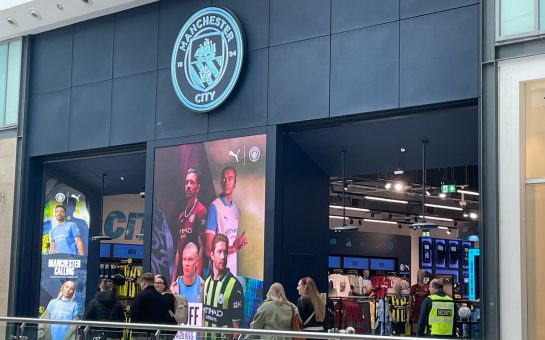The 2014 World Cup, alas, is over and Germany are champions.
Die Mannschaft won it without any players from Greater Manchester clubs – but how did the Mancunians who were at the tournament shape up?
Sergio Aguero (Argentina, Manchester City)
Aguero was unfortunate in that this tournament came when he wasn’t properly fit.
That is perhaps reflected in the fact that he managed more yellow cards (one) than goals (zero) and assists (zip) in Brazil.
He did, however, successfully convert his penalty in Argentina’s semi-final shoot-out win over the Netherlands.
Grade: B
Martin Demichelis (Argentina, Manchester City)
Initially it looked like Demichelis was going to sit out this tournament as Alejandro Sabella favoured Federico Fernandez and Ezequiel Garay at centre-back.
However, Argentina were dire against Switzerland and were extremely fortunate to progress, so out went Fernandez and in came Demichelis for the quarter final with Belgium.
The City defender stiffened the Argentine rearguard, taking them to the final – there Demichelis and co stifled Miroslav Klose and Thomas Müller, but one slip and Mario Götze made them pay.
Grade: A
Pablo Zabaleta (Argentina, Manchester City)
If Zabaleta had any rivals for right-back in Argentina’s team, we could say he made the position his own in this tournament.
As it is, he made the position his own anyway, being as consistent in defence and comfortable on the ball as he was ever-present.
Germany’s World Cup winner may have come from down Argentina’s right, but that was more down to Andre Schürrle’s stunning burst of pace than a Zabaleta error.
Grade: A
Marouane Fellaini (Belgium, Manchester United)
It looked like we might see some of the old Fellaini after his headed goal and general bustling inspired Belgium to a comeback victory over Algeria.
Instead, he was caught up in the general Belgian malaise as they reached the quarter finals despite not playing well in any of their matches.
His tendency to stand in or around the penalty area in the hope that the ball would bounce off him into the goal or towards a team-mate did little other than reduce the attacking threat of Kevin de Bruyne and Eden Hazard.
Grade: C
Adnan Januzaj (Belgium, Manchester United)
So talented but still so raw, this World Cup came too early for the United winger.
He only played in one game, against South Korea, and had little effect – Jan Vertonghen’s winner came after Januzaj had been substituted on the hour mark.
Grade: C
Vincent Kompany (Man City, Belgium)
If there was one Belgian player who stood out, it was their captain.
Defending so well he made it look effortless, he was the man who kept his head while all about him were losing theirs in extra time against the USA.
Sadly he spoiled that good work in the quarter final with Argentina by making one costly mistake – he gave the ball away to Lionel Messi, who orchestrated the winning goal for Gonzalo Higuain.
Grade: B+
Edin Dzeko (Bosnia and Herzegovina, Manchester City)
Everyone, everyone, said Bosnia were ‘dark horses’ for this tournament. So it was perhaps inevitable that they crashed out in the group stages.
Dzeko was quiet against Argentina but then scored against Nigeria… only to see the goal incorrectly ruled offside.
He then missed a series of chances created for him by Miralem Pjanic – and his fine goal in the third game with Iran was nothing more than a bitter consolation.
Grade: C
Fernandinho (Brazil, Manchester City)
The City midfielder began the tournament outside of Luiz Felipe Scolari’s XI but forced himself into it (at the expense of the hapless Paulinho), after playing the second half against Cameroon and scoring the fourth goal in that game.
He forged a solid central midfield partnership with Luiz Gustavo that took Brazil through the semi finals, but there it all fell apart – Fernandinho being shrugged off the ball by Toni Kroos for Germany’s fourth goal.
Grade: B
Jean Beausejour (Chile, Wigan Athletic)
Wigan’s Chilean winger started the tournament well, coming off the bench to score the third goal against Australia in a 3-1 victory, but faded from there.
He did not play against Spain, then came on for the second half against the Netherlands – in which Chile ran out of steam and the Dutch grabbed the win.
Beausejour watched on as his team lost on penalties to Brazil, but he can certainly take credit for his part in an aesthetically-pleasing Chile side.
Grade: B
Antonio Valencia (Ecuador, Manchester United)
Despite being captain of his country, the Manchester United winger managed to become only the second most-recognised Valencia in the Ecuador team, and compounded matters with an idiotic red card.
It was Enner Valencia who scored the goals which nearly secured a draw with Switzerland and then did secure a win over Honduras.
As for Antonio, he was quiet – until the France game, when he let his team-mates down by putting his studs into Lucas Digne and leaving the field in disgrace.
Grade: D
Joe Hart (England, Manchester City)
Hart played the first two games of the tournament, before sitting out the Costa Rica match.
Although he was technically blameless for the four goals that England conceded in those opening two games, some of the nervousness and indecision that blighted the start to his 2013-14 season returned.
Whether that affected his defenders is unclear, but their inability to keep tabs on Mario Balotelli and Luis Suarez ultimately proved fatal.
Grade: C
Phil Jones (England, Manchester United)
Not involved in either of England’s first two games, despite Phil Jagielka’s struggles.
Jones did play 90 minutes in the Costa Rica game and made a decent fist of it at right-back, even if three seasons at Old Trafford have demonstrated that he should not be played there.
Grade: C
James Milner (England, Manchester City)
Perhaps unfortunate not to see any action in England’s opening two games, given Steven Gerrard’s lack of mobility and Jack Wilshere’s lack of pre-tournament fitness.
Milner did get 76 minutes against Costa Rica, but did little besides working hard – too little, too late.
Grade: C
Wayne Rooney (England, Manchester United)
One goal and one assist in what was otherwise a poor tournament for England. Rooney should get a decent mark then, yes?
No. Germany, as Spain before them, showed that the best team wins the tournament.
Rooney is England’s most gifted player but he did not do his job for the team, failing to protect Leighton Baines against Italy and generally going missing when his side needed him most.
Rooney needs to focus on United for now, try to rediscover his form under Louis van Gaal and then think about England – because he should no longer be a guaranteed starter for the Three Lions.
Grade: C
Luke Shaw (England, Manchester United)
United’s most recent recruit had to wait for the Costa Rica game to make his first World Cup appearance.
The Southampton youth product did well – he hardly shone going forward, but then no one did in that match, and he looked more comfortable at left-back than Baines had in the previous two games, albeit under less pressure.
Grade: C+
Chris Smalling (England, Manchester United)
Like Jones and Shaw, Smalling came in for the Costa Rica match, making it an almost entirely United back four.
Unlike Jones and Shaw, Smalling looked out of his depth. Sure, he was solid defensively, but his distribution of the ball was poor.
That will not endear him to Van Gaal, who demands every player in his team be comfortable on the ball – a make-or-break season lies ahead.
Grade: C
Danny Welbeck (England, Manchester United)
It started well for Welbeck, as buzzed about in the Italy game, allowing us to wonder ‘Is this an England team playing with confidence?’
Sadly for Welbeck and England, that was it really. Against the Italians and Uruguayans, Welbeck looked bright but produced nothing of real substance.
In a sense, he is the opposite of Rooney – he will sacrifice himself for the team, but there’s little chance of him producing a goal or assist out of nothing.
Grade: C
Patrice Evra (France, Manchester United)
France played some of the best football at this World Cup, and were only narrowly beaten by eventual champions Germany.
Evra rarely sparkled offensively, but given France’s attacking options they didn’t need him to.
They needed him to be defensively solid and – surprisingly for United fans, who have watched him become a liability over the last couple of seasons – he was.
Grade: B+
Roger Espinoza (Honduras, Wigan Athletic)
Wigan have gained plenty of admirers over the last few seasons for their attractive style of play. Honduras, by contrast, seemed to confuse football with mixed martial arts.
Espinoza played in each of Honduras’ three games at the tournament, three losses with only one goal to show for their efforts.
Still, he managed not to get booked in any of those games, and given the team he was playing for, that’s something of a miracle.
Grade: C+
Juan Carlos Garcia (Honduras, Wigan Athletic)
Garcia joined his club-mate Espinoza in the Honduras squad, although he sat out the France match.
He was brought on for the second half against Ecuador and then played 90 minutes against Switzerland. Honduras lost both of those matches, but at least Garcia was a good boy and his name didn’t go into the referee’s notebook.
Grade: C
Yaya Toure (Ivory Coast, Manchester City)
Off-field matters (the death of his brother) appeared to affect the City midfielder, who disappointed as his side once again bottled it on the big occasion.
Toure played every minute of the Elephants’ campaign but failed to fire – it was Georgios Samaras who had the last laugh, winning and scoring the penalty that knocked the African side out.
Grade: C
Shinji Kagawa (Japan, Manchester Utd)
It promised so much, and delivered so little. Japan’s World Cup challenge was not dissimilar to Kagawa’s career at Old Trafford so far.
Kagawa was quiet as his side were narrowly beaten by the Ivory Coast, and was benched for the game against Greece.
Japan improved after his introduction in that game but still drew 0-0, and their fate was sealed by a 4-1 loss to Colombia.
Grade: C
Javier Hernandez (Mexico, Manchester United)
A decent tournament for the United striker, especially given his struggles under David Moyes at Old Trafford last season.
He came on as a substitute in each of Mexico’s four games, most notably against Croatia, when he scored with a typical poacher’s finish to seal the 3-1 win that took his side into the knock-out stages.
Grade: B
Robin van Persie (Netherlands, Manchester United)
The Dutch captain scored a glorious looping header against Spain to spark a thrilling counter-attacking display that stunned world champions Spain and marked out this World Cup as something special.
He scored again in that match after dispossessing Iker Casillas, then once against Australia.
After that the goals dried up, as he was often left isolated by the Netherlands’ reactive tactics, but he did score the opener from the penalty spot in the 3-0 third place play-off win over Brazil.
Grade: B+
Louis van Gaal (Netherlands, Manchester United)
The incoming United manager could hardly have done much better in this tournament with a Dutch squad limited on raw ability.
After destroying Spain with a counter-attacking 3-5-2 strategy, Van Gaal adapted his tactics to see off the varying challenges of Australia, Chile and Mexico.
His decision to sub in Tim Krul against Costa Rica was as inspired as it was risky, and it was only against Argentina that the master plan – hold tight, shackle Messi and then snatch a late goal – fell short.
Perhaps his greatest achievement was in maintaining a relaxed and positive atmosphere in the Dutch camp, which history tells us takes some doing.
Grade: A+
Nani (Portugal, Manchester United)
The United winger has suffered from injuries and poor form of late, but gets a spot in Portugal’s XI due to there being absolutely no competition.
After drifting in and out of the 4-0 thumping by Germany, Nani scored the opener against the USA, after Geoff Cameron’s attempted clearance fell right at his feet.
Otherwise he was one of many poor Portuguese performances, leaving Cristiano Ronaldo to wonder if he has any German ancestry he can take advantage of.
Grade: C
Lee Chung-yong (South Korea, Bolton Wanderers)
This is what happens when Park Ji-sung retires. The South Korea team in Brazil was the worst we’ve seen since they put themselves on the football map by reaching the 2002 semi finals.
They drew with Russia thanks to Igor Akinfeev’s butterfingers, were torn apart by Algeria and then lost 1-0 to 10-man Belgium.
The Bolton midfielder managed no goals, no assists and a 25% completed crosses rate. Lacklustre.
Grade: D
David De Gea (Spain, Manchester United)
Did not play, despite being United’s player of the season in 2013-14.
After Casillas’ nightmare two games, Vincent Del Bosque opted to put Pepe Reina in for the dead rubber with Australia.
Grade: N/A
Juan Mata (Spain, Manchester United)
Like his club-mate De Gea, Mata did not feature in Spain’s first two games of the tournament.
He did, however, get half an hour against Australia and scored with a neat finish after being found by a superb Cesc Fabregas pass to seal the 3-0 win.
Grade: C+
David Silva (Spain, Manchester City)
Silva could not carry his City form into the tournament, as Spain tamely surrendered its World Cup title.
He played in all three group games, and was at the centre of the pivotal moment of Spain’s tournament.
Sadly for Silva, it was one to forget – with Spain 1-0 up on the Dutch, he was played through by Andres Iniesta only to fluff his lines. You know what happened next.
Grade: D
Main image courtesy of FIFATV via YouTube, with thanks.



